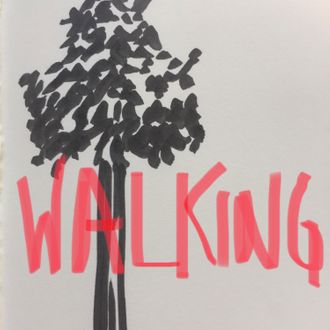
The premise of the WALKING podcast is absurdly simple as it is simply absurd: Each episode features a different ambient recording of writer Jon Mooallem — known for his works on conservation, civilization, and the relationship between the human and the natural world — as he goes on an hour-long walk through the woodlands of the Pacific Northwest.
That’s pretty much it. You hear the crunching of feet on leaves, the pop of wind hitting microphone, the ambient sounds of trees and animals and nature. You also hear some amount of breathing, as you would expect from a person engaged in mildly strenuous physical activity. Almost nothing of note happens. Occasionally, Mooallem acknowledges the presence of a passerby, or maybe stumbles on something, but that’s the most action you get. Everything else is purely a projection.
Oh, there are also ad breaks. In between long chunks of walking, Mooallem will briefly pause to perform one of those ubiquitous host-read ads. WALKING being essentially an offbeat art project, you’ll get no Squarespaces or SimpliSafes here. (For now, anyway.) Instead, the advertising is of the artisanal, small-batch variety: friends who bought an ad to promote a worthy cause that they support, or a cozy little bar that’s decided to sponsor a writer’s quirky project. It’s quite sweet.
One may argue that WALKING may signal that we’ve hit Peak Podcast. Such an argument would be understandable. After all, basically everybody has a podcast nowadays — from your co-worker to your cousin to Newt Gingrich — and there’s a podcast about everything you can possibly think of, from Harry Potter to home improvement, though it’s unclear how anybody makes significant money off of them at this point in time. (Other than, of course, being acquired by Spotify for a sum of money greater than the GDP of Micronesia.)
But those are concerns of corporate giants and capitalist crusaders, which feels so far away from the delightful quirkiness of Mooallem and WALKING. It’s bizarre and surreal, yes, but it’s also very pleasant. Mooallem’s recordings fit neatly in the sweet Venn-diagram overlap of white noise and ASMR candy, which may mean nothing to most people but is sublime to the folks who find that kind of thing addictive. (For what it’s worth, I count myself as one of those people, seeing as how I’ve lost hundreds of hours to ASMR videos on YouTube.) The sheer banality of the recordings both clears and focuses the mind, and willful surrender to the pure sensory experience can send sparks of warmth across your shoulders. Add to that the vague kick of marginal voyeurism and vicarious living — boy, I really wish I lived in the Pacific Northwest as opposed to cold, cruel New England — and you get something that’s hard to find anywhere else.
Veteran podcast listeners will note that WALKING has some conceptual precedence; specifically, Drew Ackerman’s stream-of-consciousness freebasing on Sleep With Me, the outrageously “you either love it or have no idea how to feel about it” podcast that’s designed to help people fall asleep via monotonous, nonsensical storytelling. (Art buffs and New York Magazine readers may also see a hint of Jerry Saltz’s “Just walking; not talking” photography in it as well.) But WALKING has additional capacity for political depth, given Mooallem’s broader focus as a writer on the conservation of nature. (Okay, I know this is a stretch, but I’m already writing a review of a podcast that’s literally raw recordings of a guy’s woodland walks, so I’m doubling down.)
As I listened to the podcast’s three episodes that are currently out in the world, I couldn’t help but think that these recordings will likely become memories of things we will soon no longer have. Fossil fuels continue to burn and the planet’s climate continues to change in alarming ways, and all the while, people in power don’t seem to notice — or simply do not care, despite growing evidence that they, and we as a collective, should. We persist with the nonzero chance that significant portions of our natural world will be lost to our industrial condition. If that apocalyptic time comes, will we remember the crunch of leaves beneath our feet, the sounds of birds in the trees? Or will we not care? Will, instead, our expectations of nature and the tragic impact of its loss be undermined by “shifting baseline syndrome,” a phenomenon that Mooallem described in his book, Wild Ones: A Sometimes Dismaying, Weirdly Reassuring Story About Looking at People Looking at Animals in America? (Excerpts of which Mooallem performed live onstage, by the way, that you can hear as a special episode of 99% Invisible.)
Again, I’ll readily admit all of this is a projection onto Mooallem’s banal and beautifully bizarre recordings. But what else should I be thinking about in this day and age, particularly when blanketed by the vibrant ambient sounds — so effective in clearing and focusing the mind — of a natural world still rife with life?


